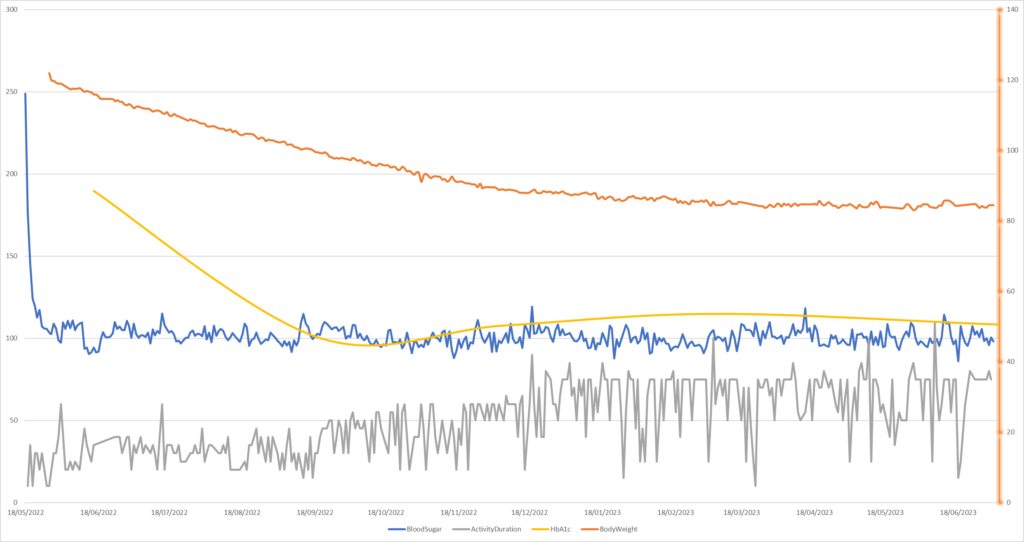I wrote this post to start a new Reddit community on reversing diabetes. I grew tired of the other communities where the credo is that diabetes is forever, that it can’t be reversed, and that it can only get worse. This isn’t supported by recent research, isn’t my experience, and shouldn’t be imposed on faith.
Just over a year ago, I did a routine blood test that showed a few strange things. Many of my levels (e,.g. liver iron, uric acid, some strange numbers) weren’t right. Also, my fasting glycemia was very high. My GP decided to have a diabetes specific batch of tests done to be sure. But to me, I had no doubt: I had diabetes.
I’m an engineer and a researcher (PhD in computing). So, my brain immediately switched into the “let’s solve that problem” mode. Straight away, I read several books on T2 diabetes, and I started reading the available research. I was amazed at how little had been published on the subject before 2005, but I read everything I found on T2DM causes, treatments, management, and branched out to bariatric surgery follow-ups. I read several hundred papers and came to the following conclusion: it’s all a matter of inappropriate storage of fat in liver and pancreas.
I also bought a new glycaemia tester with Bluetooth (Bluetooth makes everything better). No CGM here yet. I already had testers because one of my cats had developed diabetes a few years earlier, and I treated him with micro dosing and tight regulation from Dr Hodgkins. Within 3 weeks, he was off insulin, eating normally, and a lot healthier. We had won against diabetes and I was intending to do the same for myself.
With that experience, I started testing often (10-12 times a day, sometimes more) to keep track of things.
With my wife, we also changed my diet to a diabetes-friendly one: low carb, high fat, vegetarian (we were both vegetarian already). We never counted carbs or calories because to me it made no sense and I didn’t want to turn eating into a punishment. I’ve been on diets most of my childhood and teenage years, I didn’t want to do that again. With the replacement of carbs with fat, I didn’t have cravings, so it was no hardship (past the first 2 weeks of withdrawal and headaches).
I also started exercising. I didn’t do anything too strenuous; I was very overweight and exercise was hard work. I started walking 10 minutes after each meal. Nothing more. With time, I increased to 20 minutes after each meal, and switched to running.
With these changes, within a few days, my daily average glycaemia was back in the normal range.
In the meantime, my diabetes-specific tests came back and showed a lot of bad things, including a HbA1c of 7.5%. My doctor confirmed that I had diabetes and put me on Stagid (Metformin). As my numbers were already down, I wasn’t too keen on medication, but he was my doctor so we agreed to test it. That’s why on the graph below, my glycaemia fell before the first HbA1c value: it had dropped before blood test and start of medication.
Within 3 months I lost 20kg and my HbA1c fell to 5.0%. I knew from the Counterpoint and DiRECT studies that I had to aim for 15kg or more to fall back down below my personal fat threshold. My doctor wasn’t too sure what was happening but thought my blood glucose was too low. He wanted me at 6.5%, i.e. at the limit of diabetes. I told him I had no intention of being so high and I’d like to stop medication. But he decided to continue another cycle. So be it, Metformin doesn’t lead to hypos and makes it easy to keep weight gain in check.
3 months later, my HbA1c was 5.4% and I had lost 20kg more. Even my GP had to accept that I was right in my approach and that I didn’t need medication. So, we stopped Metformin and I was medication-free 6 months after diagnosis.
It is also the time when I started to re-introduce normal food: pasta, pizza, rice, even chocolate. Always keeping an eye on what was happening afterward. Only rice is still a bit harsh on my system, but well within normal range (138mg/dl spike). I just don’t like to spike above 120mg/dl.
3 months later, my HbA1c was 5.44% (probably within the margin of error of the previous test), and my weight stable. I continued to eat normally, still keeping an eye on my numbers just in case. My GP wants to see me maybe every 6 months now instead of every 3.
3 months after that, on my one-year anniversary, my HbA1c is 5.4% and my weight still stable. I consider myself now in the post-diabetes phase. I’m hoping to stay there indefinitely by keeping my weight stable.
This is what I advocate people should do. Don’t rely on medication, it has been shown that without lifestyle changes it leads to progressive diabetes. Don’t expect others to tell you what to do. Don’t wait, and take simple but effective action.




